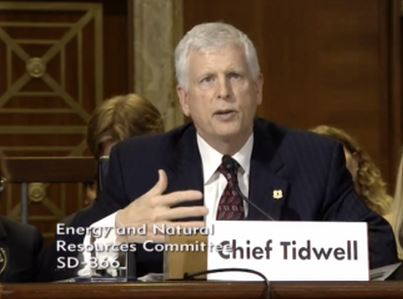
Testifying Tuesday at a hearing of the Senate Energy and Natural Resources Committee, Tom Tidwell, Chief of the U.S. Forest Service, assured the Senators that there would be an adequate number of firefighting resources available this year.
In spite of budget reductions that will cut 500 firefighters and up to 75 engines from his agency, Chief Tidwell said:
We will have the resources we need.
He said the Forest Service will rely on call-when-needed contracts for air tankers to fight wildfires, but said when they are activated they will cost “one-and-a-half to two-times” more than exclusive use contracts for air tankers that are on duty six days a week.
According to a March 22 report in the Durango Herald, U.S. Agriculture Secretary Tom Vilsack, in a letter written to Senator Mark Udall of Colorado, said contracts will be awarded “soon” for seven next-generation air tankers. Secretary Vilsack was responding to a letter Senator Udall sent to the Secretary in January requesting an update on the modernization of the federal air tanker fleet.
The U.S. Forest Service first issued a solicitation for next-generation air tankers 503 days ago but no contracts have been signed. They were almost awarded last summer but were held up by protests filed by two unsuccessful bidders. The solicitation was reissued in October of 2012 but no results have been announced.
During the second half of the western fire season last year, there were between 9 and 11 large air tankers on exclusive use contracts, down from 44 in 2002. If the USFS awards contracts for 7 next-generation air tankers, adding to the 9 Korean War vintage legacy air tankers, the agency may supplement the total with up to 8 old CV-580 air tankers if they are available from Canada and the state of Alaska. In addition, 8 military C-130s may be accessed if they are available and needed.

Ahhhh yes
Shades of 2012
AND they actually pay theses people?? Will wonders ever cease in the organization?
When you see your forests burning down just thank the paper pushers and such. Do more with less oook. As for the vols on the forest yes they do need to be trained better.We went to vist a fire lookout and the guy had no idea of the history of it .he said he was just there to be there.. lol
More political double talk.
For years resource agencies in general have been told: Doing more with more, then doing more with the same, then more with less, the same with less and last a bit of self realization that with less you are forced to do less.
I visited a major National Park not long ago and went in search of a uniformed ranger so a young friend could get a picture with a real ranger. Well after a long search we found a very polite and nice park volunteer who managed to give us incomplete and incorrect answers or just said never got any real training for this job. No offense to the volunteer, he was doing the best he could. But you get what you pay for. And by not paying for at least the same number of fire fighting resources as last year there will be less when you need them.
Let me read between the lines. 1) don’t need all those engines and fire fighters, we were over staffed. 2) six (on duty) air tankers are as good as 37 air tankers on duty during the 1980’s. 3) the national forests are healthier and less prone to burn than three decades ago. 4) a 24,000 gallon air tanker should cost the same as a 600 gallon tanker. CWN means don’t activate (until the public, press and elected officials are screaming mad) 5) just like the airlines, jet powered air planes need to have a day off per week.